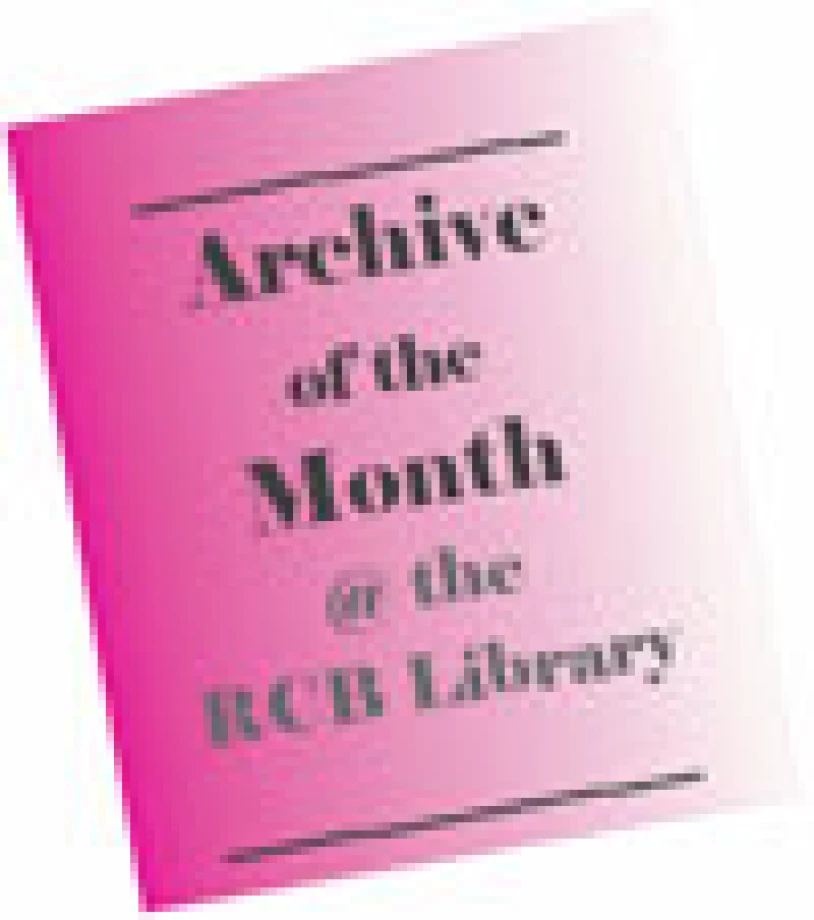March ‘Archive of the Month’
The March ‘Archive of the Month’ at the RCB Library is Douglas Hyde’s ‘modern Irish’ translation of St Patrick’s Breastplate.
Irishness and complex identity issues within the Church of Ireland in the early 20th–century are revealed in the RCB Library’s Archive of the Month online feature for March. This covers the story of Douglas Hyde’s ‘modern Irish’ translation of the St Patrick’s Breastplate hymn, which he provided at the request of Cumann Gaelach na hEaglaise, the Irish Guild of the Church of Ireland, in 1915.
In the context of rapidly–changing political and cultural life in Ireland, the Guild was founded the previous year for interested members of the Church of Ireland ‘to promote the objects of the Irish Revival’. The early minute books of this organization are kept safe in the RCB Library (MS 131), and reveal its early activities including promoting the use of the Irish language for worship, and collecting and publishing suitable Irish prayers and hymns and other religious literature.
Dr Douglas Hyde, then Professor of Irish at University College Dublin, was invited by Ethne (Anne Beatrice) Culverwell a young member of the Guild to provide a modern version of ‘the great Trinity Hymn of Irish Christianity’, St Patrick’s ‘Lorica’ or ‘Breastplate’ which survives as an 11th–century manuscript. This would later be published in a collection of hymns the Duanaire Diadha (Dublin, 1916) circulated by the Guild. Whilst various English translations of the Breastplate had been made during the 19th century, the Irish original had never been modernized, with the result that the language had changed so much that the text had become incomprehensible. A note penned by Culverwell in 1980, when she presented the translation to the RCB Library, reveals that she was deputed ‘to get a modernized version of the Breastplate’ from Hyde ‘being known to be rather a pet of his’.
Initially Hyde had said ‘he was too busy, but on pressure’ agreed that if she ‘sent him the original version of the hymn on postcardfuls [sic.] he would return me postcardfuls’ which he seems to have duly done, writing to her at the family home, ‘the Hut’ on Howth summit, County Dublin. In November 1915, the Guild’s approach (through Ethne Culverwell) to Douglas Hyde – who by then had just resigned as President of the Gaelic League – for a translation of this iconic poem was a strategic decision to capture a modern Irish version from a recognized champion of the cause to ‘de–anglicize Ireland’ – in a language sense.
Each of Hyde’s five postcard translations with accompanying notes is signed with his distinctive pet–name ‘An Craoibhín’ [the little branch]. Continuing the story, and commenting on his piecemeal return of the work, Culverwell reflected how the postcard replies were ‘characteristic of him in his playful mood’, and also how fortunate it was that he had completed the translations before ‘the great blow fell of his elder daughter’s sudden death after she had been said to be cured of T.B’. Less than a year later on 30 September 1916, Nuala Hyde died at the age of just 22.
Ethne Culverwell went on to have an interesting life. According to her unpublished memoirs, she was encouraged to take up the professorship of Irish at Trinity College, but in 1916 she married Gustavus Everard Hamilton, of Ballinteer, County Dublin, a barrister, who tragically, like Nuala Hyde, died of T.B. just two years later in 1918. She married again to the Revd George Frederick Hamilton (no relation of the first) rector of Moylough in the diocese of Tuam 1904–23, and the couple had three children, Ethne, Mary and Patrick. Two of her grandsons (Ethne’s sons) Stephen (died 1990) and Martin were ordained as Church of Ireland clergy. Martin is now rector of Kells in the diocese of Ossory. In 1980, just three years before her death in 1983, at the age of 93, Mrs Hamilton, née Culverwell, presented her treasured postcards containing Hyde’s original Irish translation of the Breastplate to the RCB Library, together with her fondly–written explanatory note, where they are accessioned as MS 163.
The full story, with images (some from the private collections of Douglas Sealy, grandson of Douglas Hyde, and Revd Martin Hilliard, grandson of Ethne Culverwell) and related archival sources from the library’s collections is available here:
www.ireland.anglican.org/library/archive
